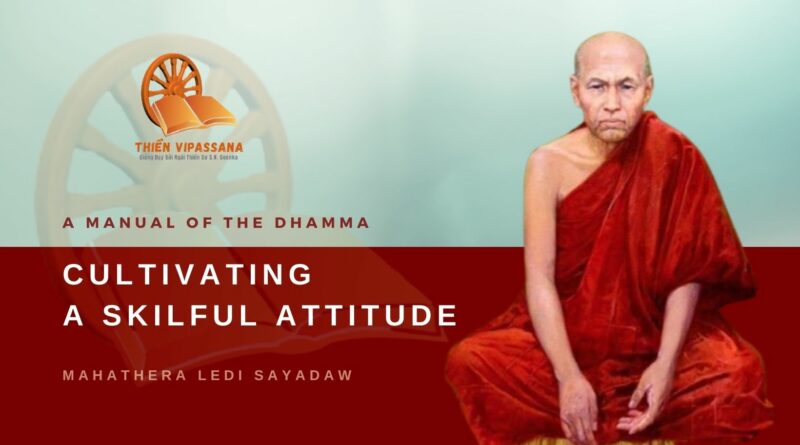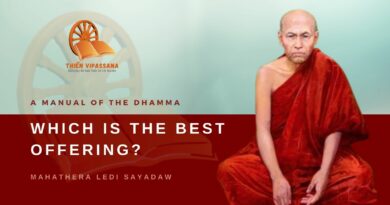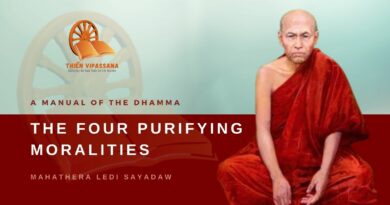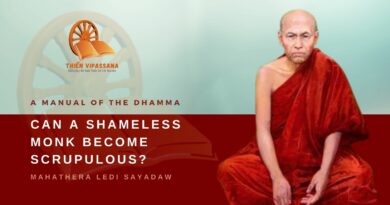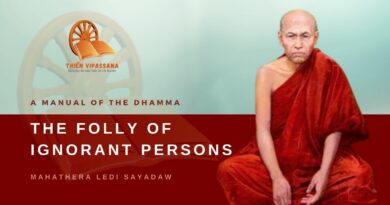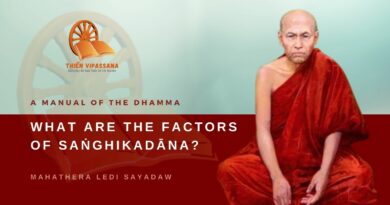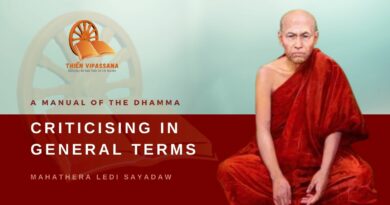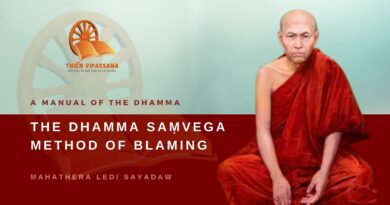Cultivating A Skilful Attitude
Having answered the thirteen questions, I will give an admonition so that the right attitude and motives can be cultivated. Serious consideration should be given to the essential guidelines taught in the Bālapaṇḍita Sutta (M. iii. 169). The simile of the blind turtle should be remembered by everyone.

 The Simile of the Blind Turtle
The Simile of the Blind Turtle
“O monks, I will give you a simile: A man makes a hole in a log and sets it adrift in the ocean. When the wind comes from the east the log drifts westwards. When the wind blows from the west, it drifts eastward. Similarly, north winds push it to the south, and south winds push it to the north. In the ocean is a blind turtle who surfaces only once every hundred years. Is it possible that the blind turtle would put his head up through the hole in the log?”
The monks replied that normally it would be impossible, but in the infinite duration of saṃsāra a chance might occur. Yet it would be very difficult for the blind turtle to meet up with the drifting log. Then the Buddha explained.
“Monks this rare chance, this freak occurrence is possible, but for a bad man who is reborn as an animal or in hell to become a human being again is rarer and more difficult.”
Rarest is the human status. Once this rare status is gone one finds greatest difficulty to be reborn again as a human being. Why? In the lower realms such as hell, no opportunities exist for the performance of wholesome deeds. So, lacking good conduct, a person in hell has to suffer for countless aeons. Those who are reborn in the animal kingdom have to struggle for existence, preying upon each other. Animals do mostly harmful deeds with their low intelligence, and the strong persecute the weak. So there is little chance for them to be reborn in the human world. The lowest probability exists for them to upgrade themselves.
For a blind turtle wandering in the ocean to encounter the hole in the log is possible only if the log never rots, and only if he lives for millions of years. Yet a much smaller chance exists for a sufferer in hell to achieve human status again, for very few wholesome kammas are possible in the lower abodes. This is explained in the Commentary.
Indeed, this is true. When close to death, a human being urgently needs good thoughts to achieve a good status in the next existence. During one’s last thought moments, previous wholesome kammas produce good mental objects, enabling one to be reborn in the fortunate realms of existence. Otherwise bad kammas will predominate at this crucial moment, and bad mental objects will send one to hell. In the four lower realms of existence a sentient being knows nothing of the value of almsgiving, keeping moral precepts, or practising meditation. Lower beings who find themselves lacking wholesome kamma are further hampered by the lack of opportunities to do good. Observe the daily behaviour of dogs, pigs, cows, buffaloes, crows and other animals. Their moral sense is very limited, so they often indulge in evil deeds. They have little chance to do good.
Therefore a dying being in the lower realms has a very slim chance of experiencing good mental objects to gain higher existences. Evil kammas usually manifest, leading again to realms of misery. Even a virtuous person in this human world cannot safely say that, at the moment of death, immoral kammas will not influence the next rebirth. Although one may have given alms, observed morality, and performed other meritorious deeds, one may experience very bad thoughts at death. Without regular practice of the four right efforts, no one can guarantee the arising of good thoughts. Every ordinary person has done countless unwholesome kammas in past lives and in this existence, which can mature at any time, producing corresponding results. For the majority of people today, wholesome kammas are relatively few. So their past immoral kammas will have to produce results in future lives.
One’s present wholesome deeds may not stem the tide of past unwholesome kammas with their impending results, which must give appropriate results at some time. As a universal principle everybody is subject to moral responsibility. All types of kammas are waiting for their chance to mature at any time. Thus, countless past kammas of various types remain for each person as latent forces. If a foolish person now gathers fresh evils, the chance of past misdeeds giving their effects increases, for like begets like.
For those who have to suffer in hell even once, the floodgate of past evil kamma opens, letting in the bad effects. So, generally speaking, various powerful evil kammas make the suffering in hell very long and tedious, as successive bad results get their chance to mature in various ways. Bad kammic results predominate in the lower realms. One has to undergo long-term sufferings for the evils of past lives too. Consider the evils done in the present life to evaluate the nature of impending bad results. Therefore, in the Sammohavinodanī, the Commentary on the Dhammasaṅganī, a note of warning is struck for this awful possibility. Some persons have to take rebirth in hell due to minor or slight misconduct. Once in hell, other grave kammas of the previous existences make their appearance too and their sufferings increases a thousand-fold. Past evil kammas are waiting for chances to manifest their influences and powers especially in the lower existences. The moral is, “don’t let evil takes its chance” or “don’t open the doors of evil.” The present life is very important.

 The Simile of the King’s Favourite
The Simile of the King’s Favourite
For clearer understanding a simile is given here. The king’s favourite, having been empowered with great authority, misuses his office for his own selfish ends. He confiscates other peoples’ property, sexually abuses girls, accepts bribes, etc., but no one dares to complain. As the king’s favourite he escapes arrest and punishment although his crimes are serious. Due to the king’s influence he lives in safety for a long time. However, one day, he happens to commit a minor wrong that enrages the king, who orders his arrest and prompt punishment. As soon as the news of his arrest is known, all his past victims make their complaints to the king. The king orders investigations and inflicts severe punishments when the cases are proven. Yet more victims now come to the king to seek redress. This is an analogy for the accumulation of bad effects for an evil person when his destiny is downgraded by a minor or major fault, as the case may be.
Note that even a small misdeed can give hellish results. Once in hell, one suffers for longer as the serious results of long dormant evil kammas mature to give appropriate results at what is now the right time and place. In the eight great hells, countless millions of sufferers are tortured for aeons. Any opportunity for them to return to this human world is very remote as no good kammas can be practised there. This accumulative nature of kamma must be studied alongside the Simile of the Blind Turtle. This analogy agrees with them.

 The Five Greatest Rarities
The Five Greatest Rarities
Among trillions of beings¹⁹ who endure the results of evil kammas in the lower realms, very few are reborn again as human beings. Based on this inherent feature of Dhamma, the Buddha declares in the Aṅguttaranikāya the “Five Greatest Rarities” or the “Five Hardest Things” (dullabha). They are so called because of the very small chances to attain them. Human existence is one of the greatest of rarities, as human birth is very hard to attain. One must cultivate right thoughts regarding the plight of countless beings in the lower realms. In the Aṅguttaranikāya the Buddha declares: “Manussattabhāvo dullabho — human life is a rarity.”
The bodhisatta Metteyya will achieve Buddhahood in the era of ascending human longevity after an era when the duration of human life falls to just ten years. Metteyya Buddha’s dispensation will last only two or three hundred thousand years. Though this may seem like a long time, it is too short for the beings in hell to become humans and meet his dispensation. For them, this amounts to just two or three existences, so the chance of meeting him is very remote.
After Metteyya Buddha’s dispensation, three succeeding aeons will be devoid of Buddhas — they will be eras of spiritual darkness. No Buddha will appear in this aeon after Metteyya.
Those who treasure the incomparable Three Refuges and Buddha’s dispensation today, have many rare opportunities to perform charitable deeds, to observe five or eight precepts, and to undertake meditation for concentration and insight. Such good persons have appreciated the great value and significance of Gotama Buddha’s dispensation. Furthermore, for these devoted and wise persons at present, an encounter with Metteyya Buddha’s dispensation is very probable. The reason being that they devotedly live as good human beings, as scrupulous monks, as devoted lay supporters, ardent meditators, etc. They will gain liberation, as they seek wisdom in this present dispensation with a skilful attitude and noble conduct. They may become Noble Ones in this very life. If not, they are certain to meet the coming Metteyya Buddha according to their wish. The point is that for them, basic ethical and insight attainments do not degenerate any more. No moral lapses or weaknesses will appear. Naturally, with the forces of past and present good kamma, they are bound to win liberation in this dispensation, or during Buddha Metteyya’s dispensation.
While Gotama Buddha’s dispensation retains its pristine purity, all human beings have rare opportunities to cultivate confidence, charity, morality, and insight meditation. If they can recognise these noble factors and fine characteristics, people possess good perfections. They appreciate the special significance and power of taking the Three Refuges, so they perform a unique meritorious deed. They now practise noble morality, concentration, and wisdom, which prevail only during the Buddha’s dispensation. Their meritorious deeds will bring them at least to the six celestial realms. At best they will attain Stream-winning and higher stages in this life or the next. As they fully appreciate the significance of the Three Refuges, when noble deities in celestial realms teach the Dhamma, they will instantly become Noble Ones. Because the noble deities in the six higher realms live for innumerable years, the Buddha’s dispensation prevails in the celestial realms long after it is extinct in the human world. So a good ordinary person will certainly attain liberation in the celestial realms, with the four great moral efforts. For the noble deities the duration of the Buddha’s dispensation on earth is just a few years, but for them the dispensation will continue for aeons.²⁰ Most Noble Disciples of Buddha Gotama’s time have been reborn in these celestial abodes. They are true sons and daughters of the Buddha, and so can teach the true Dhamma. Non-returners dwell in the Suddhāvāsa Brahmā realms (the Pure Abodes), so those disciples who fail to win nibbāna in this world can listen to the Noble Dhamma if they are reborn in the brahmā realms. So excellent opportunities prevail for all true Buddhists to realise nibbāna in the celestial realms.
The Bodhisatta Metteyya is now living in the Tusita celestial realm. With him are Noble Disciples of Gotama Buddha, who were reborn in this unique realm before or after the Buddha’s parinibbāna. Stream-winners from ancient Sri Lanka were naturally reborn in this celestial realm too. In every celestial realm Noble Ones of this dispensation will help others by preaching the Four Noble Truths.
Devoted and wise persons get inspiration by reading the biographies of Visākhā and Anāthapiṇḍika, and greatly admire their noble good deeds. However, they learn of their noble deeds only from the study of history. They do not personally encounter these famous disciples of the Buddha. If they are reborn in celestial realms, they will personally meet these famous Noble Ones. They will then certainly become Noble Ones too, as there are countless Noble Disciples to guide them to liberation. Devoted people, due to their charity, morality, and efforts in meditation, will enjoy refined sensual pleasures in higher abodes, even if they do not become Noble Ones. Finally, after many rounds of fortunate rebirths, when Metteyya Buddha arises in this world, they will certainly win liberation. They will surely meet Metteyya Buddha due to their good kamma during this dispensation, and will certainly realise nibbāna too. It is therefore noteworthy that men and women with this knowledge during Gotama Buddha’s dispensation, possess rare and unique opportunities to achieve the best things in life, both now and hereafter.
However, ordinary meritorious deeds cannot open the doors to these unique opportunities and give the rare chance of salvation, because ordinary people do meritorious deeds without insight knowledge. So lay people should not rely solely on almsgiving. Those who have taken up the yellow robes should not feel safe in the Buddha’s dispensation as they are just in the preliminary stages. Most of them are ordinary persons. If novices and monks practise the fourfold purifying morality, and fully attain the seven factors of a good man, they will reach the stage of safety. As the great power of morality during this dispensation leading to nibbāna is present, this type of person will at least reach the stage of a lesser Stream-winner (cūḷasotāpanna). Insight is essential for nibbāna.
Because a full Stream-winner (sotāpanna) is completely free from moral lapses and suffering in hell, the lesser Stream-winners also escape these great evils and sufferings, although they are not full Stream-winners yet. Due to their insight into mind and matter (nāmarūpapariccheda ñāṇa), and their habitual observance of the five precepts, they are similar to Stream-winners of the highest grade. Living in these rare circumstances, with the greatest of opportunities, no one should blame others’ wickedness and failures. No one should pay any attention to others’ faults, or waste time blaming the evil actions of others. One must live steadfastly practising the Dhamma oneself, thinking only of one’s own rare opportunities, which must be seized with strenuous moral effort.
Inevitably, in this Buddha’s dispensation, some monks show moral and intellectual lapses and backsliding. They consciously or unconsciously break the Vinaya rules, both minor and major, and live heedlessly. However, a knowledgeable and mature person (a wise lay supporter) must not pass judgement or blame them. For one’s greatest responsibility is to follow the path of righteousness with one-pointedness. Only by taking care of oneself can one walk on the path steadfastly. Others’ evil acts and faults are not one’s concern, none of one’s business.
If one regards others’ faults and blames them, one suffers by defiling one’s own mind, and accumulates greed, anger, and delusion in the process. One becomes impure and one’s confidence wavers. These subtle unwholesome deeds, will show their power when one is about to die, and will push one down to hell. One’s own impurity in physical, vocal, and mental conduct can bring about hellish results at the time of death. The Pāḷi texts and Commentaries consistently caution that once in hell, chances to become a human being again are very slim. A fallen person usually goes downwards, being reborn as a hungry ghost, an animal, or in hell, successively.
Since unwholesome kammas operate most effectively in the lower abodes, to be reborn as a human being, deity, or brahmā, is very difficult. The Buddha used the term “dullabho,” which means “hard to get the good planes of existence.” So even if a being in hell attains a higher life on account of his past kamma, most fail to reach it during the duration of a Buddha’s teaching. So to be united with Noble Ones in celestial realms when his good kammas bear fruit, is a very remote possibility. Human beings in this dispensation are unlikely to meet Metteyya bodhisatta in Tusita, or after he becomes Buddha, if they are satisfied with ordinary morality and almsgiving. From this standpoint their ordinary morality and charitable acts become useless or futile.
Why? They are useless in the sense of giving effects only for the attainment of celestial and human pleasures or mundane bliss, which are commonplace and temporary things. After suffering in hell, a being attains a higher existence due to past good kamma, but heavenly bliss and human happiness are not unique. Many times one has been a deity or a human being. In future too one will certainly become a powerful deity or king. Merits done during the Buddha’s dispensation should not have such low aims. For after enjoying heavenly bliss, all may become human beings again as rich men, powerful kings, etc. These kammic results are very common and are not especially desirable in this dispensation. The chief aim of the dispensation is to realise nibbāna, to actually know through insight the Four Noble Truths, that is, to become a Noble One. In other words, by means of insight one must obtain the path and its fruition, which have nibbāna as their object of cognition. Mere wishes and prayers will not do. Past vows, inclinations, and aspirations have given devotees the chance to attain this noble aim of nibbāna in a short time through the practise of mindfulness. The primary goal of the Buddha’s dispensation is to realise nibbāna here and now. Speedy liberation is best, because for countless lives one has aspired to win liberation from sorrow and suffering.
This noble aim is possible to attain during this Buddha’s dispensation, so nibbāna must be won by insight. This is the unique feature of the Buddha’s teaching. If one aims at mundane or heavenly pleasures, one will not only miss Gotama Buddha’s dispensation, but also that of Metteyya Buddha. Hence the term “useless” is attributed to ordinary merits, which only lead to worldly joys. If one fails to meet Metteyya Buddha due to these reasons, countless aeons intervene when there is no dispensation. For this reason too, the meaning of “useless” meritorious deeds should be understood.
A special class of skilful conduct exists for the attainment of the path, its fruition, and nibbāna. This is called “Pāramī Kusala” — wholesome perfections for the achievement of liberation, crossing over the ocean of saṃsāra. Even among perfections, two categories can be seen:
- Stable (niyata).
- Unstable (aniyata).
For bodhisattas, having received assurance from a Buddha, good conduct becomes natural, and certainly leads to nibbāna. In such a person, meritorious deeds are extremely powerful and do not lose their force at all. They always give their desired results or effects. During any existence, bodhisattas perform all kinds of perfections until nibbāna is attained in their final existence.
The meaning of unstable perfections or ordinary perfections, is that they lack profundity and stability, and are mostly devoid of wisdom. As they are weak in nature they are not certain to bring the desired effects. One who has done such perfections can attain nibbāna if they meet a Buddha, in which case ordinary generosity, morality, etc., can lead to nibbāna. To that extent these merits are excellent, but in the absence of a Buddha’s dispensation, good deeds done with self-view will only prolong the suffering of saṃsāra. The power of wholesome kamma diminishes and finally disappears as one wanders through countless rebirths. So those with unstable perfections, even if they meet a Buddha, do not receive the assurance to become Buddha. Their good kamma is not of the stable, powerful type. In the cycle of existences they can do very grave evils and end up in hell, so other wholesome deeds cannot give their benefits. Powerful bad kammas take precedence in lower realms. So the weak unstable good deeds are classified as “Aniyata kusala”, which means “unstable meritorious deeds.”
Those who realise the value of a human existence in this Buddha’s dispensation should not consider the faults and defects of others. No attention should be paid to the affairs, shameless behaviour, ignoble conduct, or bad character of others. One must regard only one’s own rare opportunities and high status in the Buddha’s dispensation. Amid turmoil, one must maintain poise and serenity at all times. Abuse, condemnation, criticism, slander, and accusation, will bring unwholesome kamma for oneself.
Realising the urgency of one’s own one task, must be steadfast and equanimous, ignoring the mistakes and faults of others so that one’s mind remains undefiled. I will give a simile to illustrate the skilful attitude.

 The Simile of the Shipwreck
The Simile of the Shipwreck
A ship was wrecked, and sank. The passengers, facing great danger, started swimming to save their lives, facing death at any moment. Seeing their pitiable plight, an ocean-deity wanted to save them. However, their past good kamma was weak, so direct rescue was impossible. The best he could manage was to create a log for each of them. Each survivor must grab a log and swim ashore. The necessary condition to gain safety was observance of the five precepts. With strenuous, constant effort, they must exert themselves to reach safety. During their struggle, the swimmers might see sharks, crocodiles, whales, and swordfish, but must not pay any heed to them. They must entertain neither malevolence, fear, nor contempt for these cruel creatures. While they struggled to find safety, ogres and demons would frighten them, and try to drown them. Sea monsters would make derisive remarks at their pathetic efforts, but they must not be angry, nor pay any attention to their odd appearance. Evil thoughts should not be entertained, for one would then surely fall from the log and perish.
The above advice was given by the ocean-deity with a stern warning that his advice must be strictly obeyed. If they strictly obeyed his instructions, he assured them, they would surely arrive at a huge sandbank. This sandbank, though helpful for some rest, was neither their destination nor a safe place to dwell for long, for waves could overwhelm it at any time. Every person must swim with the log again to each successive sandbank. Then after ten days of constant, relentless effort, another ocean-deity would appear before them, and put them on a rescue ship laden with seven kinds of treasure. On this ship, the survivors would duly arrive at a big city-port where they would, at last, dwell in safety and abundance. This was the deity’s further advice.
Fearing for their lives, all obeyed the instructions of the ocean-deity. While swimming with the log, they believed implicitly in his prophecies. With unshakable faith and resolute determination to reach safety, they exerted themselves and soon reached the city. Their minds were fixed on exertion only. They all followed the five precepts religiously. Due to their perilous predicament, they were resolute and earnest to reach safety. They were equanimous and constant in their struggle, At last, they saw the ocean-deity and reached the rescue ship with seven great treasures. When they arrived safely at the port, they became wealthy.
Their goal was achieved only by observing precepts and making strenuous efforts. Observing precepts includes equanimity and detachment regarding others’ misdeeds, scorn, insults, ridicule, and odd behaviour. Likewise, in full knowledge of the noble, rare and unique powers that prevail in this dispensation, everyone should adopt the attitude of the survivor of a shipwreck. Others’ moral failures and misconduct must be ignored so that steadfast progress can be made every day. Everyone needs grace and serenity in daily life. So pay no attention to others’ faults. Don’t criticise others’ misbehaviour for a moment. Strong, detached determination must be maintained at all costs in one’s struggle to win the cessation of suffering.
In the above simile, the first ocean-deity is Gotama the Buddha. The second ocean-deity is Metteyya Buddha. The log is the attainment of human life. The sandbanks are a series of higher planes of existence, in human and celestial realms. The city port is nibbāna, the ultimate goal of safety. The sharks, crocodiles, whales, and swordfish are ordinary people. The ogres and demons who make derisive remarks are like shameless and immoral monks in the Buddha’s dispensation. Survivors who pay attention to their misdeeds, defile their own minds. Everyone must overlook the odd behaviour and defects of others if the goal is to be attained. The other points in the story are now easy to understand.

 Choose the Right Path
Choose the Right Path
One must know two paths clearly with insight and choose wisely. A person needs to examine his or her own character very thoroughly. One must avoid blaming others’ shameless, immoral, or bad conduct until the end of one’s life. A wise person must use this precious human life to attain liberation, morality, and restraint. Then one will achieve nibbāna in successive higher abodes, either in this dispensation or in Metteyya Buddha’s. By any means, final liberation must be won during the time of Metteyya Buddha, and the mind must be set on this resolutely. One must not allow one’s mind to be polluted by the misbehaviour of others.
To attain the ultimate goal under Metteyya Buddha, one must practise generosity, morality, and meditation. Then one will surely encounter his dispensation and then win liberation. No one must miss this final chance. Two fundamental virtues must be cultivated now by striving with the four right efforts to one’s utmost. These two virtues are wisdom and good conduct.
What is wisdom? It means insight into the characteristics of impermanence (aniccānupassanā-ñāṇa), unsatisfactoriness (dukkhānupassanā-ñāṇa), and not-self (anattānupassanā-ñāṇa).
What is good conduct? As already mentioned, for the laity it means eight precepts with right livelihood as the eighth, and the attainment of the characteristics of a good man. For monks it refers to the fourfold purifying morality. Among these two basic requirements, good conduct creates the conditions to reach happy destinies, which means freedom from suffering in hell, from evil deeds and the consequent suffering in lower realms. Thus even temporary morality ensures that one will encounter the next Buddha. So the seeds of good moral conduct must be sown anew.
If one also sows the seeds of wisdom in this life, one will be sure to meet the next Buddha, and will also win liberation. However, if only the seeds of wisdom are sown without sufficient moral conduct, one will face many hardships. Evil kamma will produce suffering in the lower realms. One will be like a traveller who lacks sufficient food for a long, arduous journey, and so perishes without reaching his destination.
Another type of person tries to obtain good moral conduct to the greatest extent, but fails to gain insight. Though he or she has good conduct, it is accompanied by superficial wisdom, which does not lead to liberation. This case is like rotten seeds, which are useless even when sown in fertile ground. Good conduct enables such a person to meet Metteyya Buddha, but he or she cannot then gain enlightenment due to lack of cultivation of wisdom in past lives. Due to the power of morality he or she obtains wealth, status, and safe conduct to the presence of the Buddha. However, having only superficial wisdom, he or she fails to realise nibbāna during Metteyya’s dispensation, in spite of meeting the Buddha and devotedly paying respect to him. Being satisfied with the honour of being a lay supporter, donating an ordination hall or building a pagoda, he or she fails to become a Noble One. If such a person joins the Saṅgha, he or she remains as an ordinary monk or nun.

 The Simile of the Birds
The Simile of the Birds
I will give another simile to illustrate the above points. Good conduct is like a bird’s wings and legs, while wisdom is like a bird’s eyes and beak. The distance to the delicious mango grove in the huge forest is like the time between this dispensation and the next. Wild mango groves represent the fortunate realms of existence. Underneath the mango trees, cobras lie in wait to catch any birds that fall from the trees. Every bird landing on the ground becomes prey to these venomous snakes. So the ground symbolises the lower realms. Those birds having good wings, legs, eyes, and beaks land on the mango trees and eat the delicious fruits as they wish. Hence they are happy and well-fed. If a tree lacks good mangos, they fly to another tree to feed themselves, and live safely on them. These happy, well-fed birds with complete faculties living in safety, are like laity and monks who possess both wisdom and conduct.
Some birds have good wings, but defective beaks, so they cannot eat the delicious mangos. As they have two good wings like other birds, they arrive at the delicious mango grove. However, as they lack good beaks they cannot taste the delicious juice of the mangos. Yet they can still enjoy the pleasure of taking shelter on the trees and resting on the branches. They enjoy the fine scenery and serenity of these rare, beautiful mango groves, but due to their defective beaks, they cannot taste the fruit of Dhamma and understand its flavour at all.
These birds are similar to those who, in this dispensation, are satisfied with their virtuous conduct, but lack wisdom. They live without developing wisdom. So they will encounter the next Buddha, but will not taste freedom as they have no insight.
There is a third type of bird. They have good beaks, but their wings are damaged. They fail to reach the mango grove and taste the unique mango fruit, so they live in vain. Similarly, in this dispensation, some monks and laymen learn Sutta, Vinaya, and Abhidhamma, but they lack good conduct. Not knowing the taste of liberation, they resemble birds walking on the ground where rats and snakes wait for them.
As devoted laity and intelligent monks have now encountered this extremely rare dispensation, they should all be like the first type of birds. Wisdom and morality should both be cultivated. If they have well-rounded abilities, after their death they will reach the higher realms, and will encounter the next dispensation. When they listen to the Dhamma they will be sure to attain liberation.
The moral is that in this life, having encountered the dispensation, wisdom and conduct must be cultivated with earnestness. Everyone must develop moral conduct and genuine wisdom with vigorous energy and firm confidence during the present Buddha’s dispensation, as this very rare and great opportunity only exists now.
These words of admonition are for the questioners who have asked thirteen questions concerning the misconduct of monks, and the problems arising from relationships between the laity and the Saṅgha.
Here Ends the Dhamma Dīpanī
 Notes
Notes
1. “Yampi so Tathāgataṃ vā Tathāgatasāvakaṃ vā akappiyena āsādeti, iminā pañcamena ṭhānena bahuṃ apuññaṃ pasavati — Also, whoever offers to the Tathāgata or to the Tathāgata’s disciple what is not allowable, in this fifth case makes much demerit.” (Jīvaka Sutta, M. i. 369). The word “āsādeti”means “invite to accept” or “offer,” so a lay person makes demerit even if a scrupulous monk refuses to accept money. Any honest person will be insulted if offered a bribe. To offer money to a monk is also an insult.
2. Following a wrong course through desire (chandāgati), aversion (dosāgati), ignorance (mohāgati), or fear (bhayāgati).
3. From now on they will be called scrupulous monks, ed.
4. Human (manussa), elephant (hatthi), horse (assa), dog (sunakha), snake (ahi), lion (sīha), tiger (byagghaṃ), panther (dīpiṃ), bear (acchaṃ), and hyena (taracchaṃ).
5. If a monk is too sick to attend the Uposatha ceremony he must send his declaration of purity and consent to the Saṅgha through another monk. (ed.)
6. One motion, followed by three announcements.
7. In this context, ‘immoral’ also means ‘shameless’ as it is opposed to ‘moral.’ Cf. the bodhisatta’s definition of moral (sīlavantaṃ) above (ed.)
8. Navakoṭisahassāni asītasatakoṭiyo, paññāsasatasahassāni chattiṃsā ca punāpare. 9,180,150,036 if one koṭi is taken to be 10⁶ (Vism.46). This huge number is arrived at by permutation —‘peyyālamukhena niddiṭṭhā.’
9. Not to be confused with the novice’s ten precepts. (ed.)
10. “I allow you, monks, to expel a novice with [any of] ten faults. He kills living beings, steals, is unchaste, tells lies, drinks intoxicants, criticises the Buddha, Dhamma, or Saṅgha, holds a wrong view, or seduces a nun.” (Vin. i. 85).
11. This must refer to verses 137-140 of the Dhammapada, not verse 125 quoted here. The ten evil results are: severe pain, loss of wealth, bodily injury, serious illness, madness, oppression by the king, a serious accusation, loss of relatives, destruction of property, or fire will burn his house. (ed.)
12. When monks decide on cases of defeat they must use the highest standards of proof, like judges of serious crimes who must be certain before pronouncing a death sentence (ed.)
13. Dhammapada Commentary to verses 133-134.
14. Dhammapada Commentary to verses 38-39.
15. “Tattha asaṃkilesāpajjanena ācāraguṇavavatthānena.”
16. Lay Buddhists should scrupulously apply the four factors to each of the ten unwholesome deeds. This exercise will reveal many defilements. (ed.)
17. One does it oneself; one advises, urges, or incites others to do it; one consents to it or condones it; one speaks in praise of it.
18. There are four types of Noble Ones who have attained the four paths, and four types striving for the four paths — eight in all. (ed.)
19. The Hutchinson Encylopedia says: “Approximately 600 trillion (million million) krill thrive in the Southern Ocean. Together they weigh more than the entire human population.” (ed.)
20. After listening to the Sakkapañha Sutta, Sakka, the king of Tavatiṃsa gained Stream-winning. He will live for thirty-six million years as the celestial king of Tavatiṃsa. So, for him, the two thousand six hundred years of the present dispensation is equivalent to just two and half days in the life of a hundred-year-old man. (Ed.)

